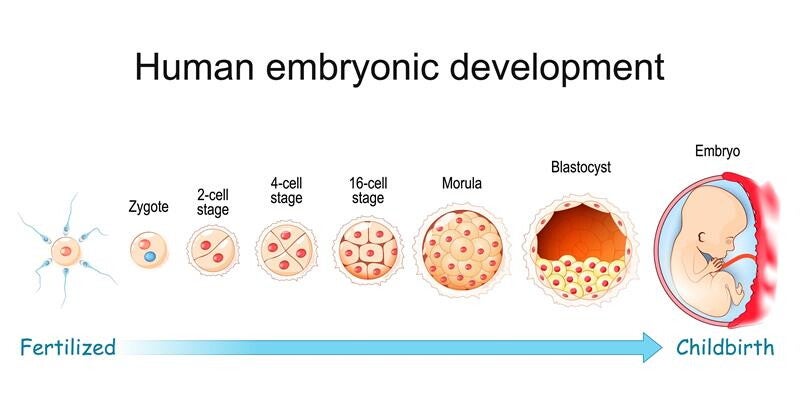
1 Month Pregnant? A Guide to Symptoms, Baby Development, and Nutrition
Understand exactly what happens when you're 1 month pregnant! Explore common symptoms, how your baby starts growing, and vital nutrition tips for this crucial stage.
So, you've just found out you’re 1 month pregnant. Congratulations! You're navigating the very beginning of your parenthood journey! You're probably buzzing with questions about early symptoms, what's happening inside your body, how your tiny baby is starting to grow, and what you should do next.
While it might seem incredibly early, crucial developments are already underway. Explore what being 1 month pregnant means for you and your little one.
Weeks 1-3: Pre-Conception to Implantation

Journey to Implantation: The fertilized egg divides and travels to the uterus, becoming a blastocyst ready to implant.
To understand what's happening now in the first month, it helps to know how doctors typically date a pregnancy. It starts from the first day of your last menstrual period (LMP), even though conception usually happens around week 2 or 3.
- Week 1: This week technically counts the days of your period. Your body is shedding last month's uterine lining and preparing a new egg for release.
- Week 2: Ovulation usually occurs mid-cycle. If you have intercourse around this time, sperm can meet the released egg in the fallopian tube, leading to conception (fertilization).
- Week 3: As the fertilized egg (zygote) travels down the fallopian tube, it rapidly divides cells, becoming a blastocyst. Towards the end of this week or early in week 4, the blastocyst attempts to implant itself into your nutrient-rich uterine lining.
Week 4: Confirmation and Early Development
This is when pregnancy starts to feel real. Implantation is complete, and your body begins producing hCG (human chorionic gonadotropin) in earnest—the hormone detected by pregnancy tests.
Physical changes and symptoms in your body

Your body is changing! Early signs like fatigue or nausea are common as hormones shift during this first month.
As your body adjusts to pregnancy, you might notice some early signs. Hormonal shifts trigger various symptoms, so you might have several or just a few of these symptoms.
- Missed period: Often the very first clue that you might be pregnant.
- Implantation bleeding: You might experience light spotting or brownish discharge around the time the embryo implants. It's usually much lighter than a period.
- Fatigue: Feeling unusually tired is very common.
- Tender, swollen breasts: Your breasts might feel sore, tingly, or heavier.
- Nausea (morning sickness): This can occur at any time of day, not just in the morning.
- Bloating: Hormones can slow digestion, leading to a bloated feeling. Your 1-month-pregnant tummy won't show a bump yet, but you might feel less comfortable in tight clothing. A visible 1-month-pregnant belly isn't typical.
- Frequent urination: Increased blood flow and kidney efficiency can send you to the bathroom more often.
- Mood swings: Fluctuating hormones can affect your emotions.
- Pregnancy cravings or aversions: You might suddenly desire certain foods or find others repulsive.
How do you feel when you’re 1 month pregnant? Physically, you might feel slightly off—perhaps more tired, nauseous, or bloated. Emotionally, it can be a whirlwind of excitement, anxiety, joy, and disbelief. It's okay to feel a mix of everything! These symptoms are your body's way of adapting.
Fetal development at 1 month
Significant fetal development is already underway, explaining many changes you might feel. Once implanted, the blastocyst rapidly transforms:
- Your embryo's size: At 4 weeks pregnant, your baby is tiny, like a poppy seed (1-2 mm). This stage focuses on rapidly forming foundational structures.
- Formation of key body parts: The fertilized egg divides into three distinct layers of cells, which will eventually give rise to all organs and tissues. The neural tube (which becomes the brain and spinal cord), heart, and circulatory system are beginning to form.
- Developing the placenta and sac: The amniotic sac and fluid start developing to cushion the growing embryo. The yolk sac provides early nourishment, and the placenta begins to form, establishing the vital connection for nutrient and oxygen exchange via the developing umbilical cord. A 1-month-old fetus (technically an embryo at this stage) is entirely dependent on these emerging structures. You wouldn't typically see much detail in an ultrasound yet, perhaps just the gestational sac.
Nutrition for a Healthy Pregnancy
Healthy nutrition is key to fueling your body and your baby's growth during Week 4 and beyond. Focus on a balanced diet rich in essential nutrients.
- Folic acid (folate): This B vitamin is critical in the first month for preventing neural tube defects. Aim for at least 400-600 mcg daily before conception and throughout early pregnancy. Good sources include leafy green vegetables (spinach, kale), fortified cereals, beans, lentils, and citrus fruits. Your doctor will likely recommend a prenatal vitamin containing folic acid.
- Other key nutrients: Ensure adequate intake of iron (for blood production), calcium (for bones), Vitamin D (for calcium absorption), and protein (for building tissues).
- Foods to avoid: Avoid alcohol, raw or undercooked meats and eggs, unpasteurized dairy products, high-mercury fish (like shark, swordfish, and king mackerel), and limit caffeine intake.
- Food safety: Practice safe food handling. Always wash fruits and vegetables thoroughly, cook meats to the proper temperature, and avoid cross-contamination in the kitchen.
- Pregnancy diet: Aim for a balanced diet focused on whole foods like fruits, vegetables, lean proteins, whole grains, and healthy fats, and stay well-hydrated with plenty of water. While studies show that common Filipino diets during pregnancy feature plenty of rice, fish, and vegetables, they also indicate lower intake of fruits, meat, dairy, eggs, beans, and nuts. So, make sure to incorporate a variety from all these food groups.
Tips and Advice for Your First Month
Navigating these early weeks can feel overwhelming. Here are some key tips covering essential next steps:
Consult your doctor
It's essential to see a doctor or midwife early on. They will confirm the pregnancy (often via blood test or early ultrasound), estimate your due date, review your health history, and guide you on the next steps.
Seeking timely prenatal care is important! A recent study shows that inadequate care (in terms of timing, number of visits, or content) is linked to increased risks of preterm birth and low birth weight. So, aim to have this first visit before the end of the third month.
Discuss supplements with your doctor
Always consult your doctor before taking any vitamins, minerals, or herbal supplements. They will recommend a suitable prenatal vitamin based on your needs.
Make necessary lifestyle adjustments
If you smoke or drink alcohol, now is the critical time to stop. Discuss any medications you're taking with your doctor.
Prioritize rest and self-care
Listen to your body. If you feel tired, rest. Manage stress through gentle exercise (if approved by your doctor), relaxation techniques, or talking to a supportive partner, friend, or family member.
Know when to seek urgent care
While many early symptoms are normal, contact your doctor immediately if you experience severe abdominal or shoulder pain, heavy bleeding, severe dizziness, or persistent, severe nausea and vomiting.
Being 1 month pregnant is just the start of an incredible transformation. Embrace the changes, prioritize your health, and don't hesitate to seek information and support from your healthcare provider. With proper care and guidance, you can look forward to an incredible journey ahead!
Connect with other parents on our ParenTeam Moms and Dads Facebook Group and share your experiences of being 1 month pregnant!
References
Betz, D., and K. Fane. "Human Chorionic Gonadotropin." In StatPearls. Treasure Island, FL: StatPearls Publishing, January 2025. Updated August 14, 2023. Accessed May 5, 2025. https://www.ncbi.nlm.nih.gov/books/NBK532950/.
Oliver, R., and H. Basit. "Embryology, Fertilization." In StatPearls. Treasure Island, FL: StatPearls Publishing, January 2025. Updated April 17, 2023. Accessed May 5, 2025. https://www.ncbi.nlm.nih.gov/books/NBK542186/.
U.S. Food & Drug Administration. "Dietary Advice Before and During Pregnancy." Content Current as of July 30, 2024. Accessed May 5, 2025. https://www.fda.gov/food/people-risk-foodborne-illness/dietary-advice-a….
World Health Organization. "Daily iron and folic acid supplementation during pregnancy." Last updated July 26, 2024. Accessed May 5, 2025. https://www.who.int/tools/elena/interventions/daily-iron-pregnancy.
World Health Organization. "Periconceptional folic acid supplementation to prevent neural tube defects." Last updated August 9, 2023. Accessed May 5, 2025. https://www.who.int/tools/elena/interventions/folate-periconceptional.
Yamashita, Takeshi, Rizza E. D. Roces, Cecilia Ladines-Llave, Maria Theresa R. Tuliao, Millicent W. Kamau, Chisa Yamada, Yoko Tanaka, Kohei Shimazawa, Shota Iwamoto, and Hiroshi Matsuo. "Dietary Intake Quality Is Affected by Knowledge and Dietary Intake Frequency among Pregnant Women in Muntinlupa, Philippines: A Cross-Sectional Study." International Journal of Environmental Research and Public Health 18, no. 23 (2021): 12306. Accessed May 5, 2025. https://doi.org/10.3390/ijerph182312306.




























